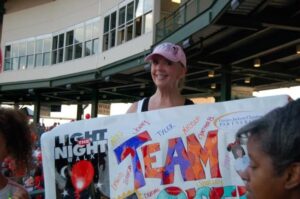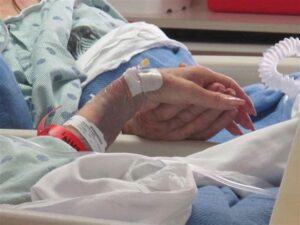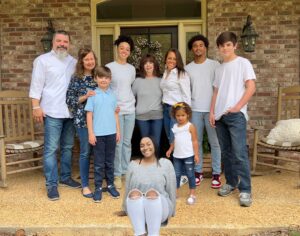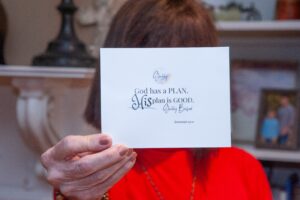By Katie Ginn

In Debi Green’s living room in Brandon, a canvas illustration hangs on the wall. In the foreground of the picture, a lamb stands alone on a muddy trail in the woods. The lamb is clearly lost, and not anywhere near green pastures or still waters.
But in the background, a blurry figure is running – sprinting after that lamb as fast as He can.
Like many believers, Debi sees her testimony in this image, though at times, trials have seemed to pursue her almost as fast as the Lord: Divorces, cancer, car wrecks.
But as a 28-year leukemia survivor who initially was given five years to live, she’s not so worried about herself anymore. Instead, she wants to show compassion to others, whether it’s her family, or inmates at the Central Mississippi Correctional Facility, or business members of the Greater Jackson Chamber Partnership, where she serves as vice president.
“God has a plan, and His plan is good,” Debi says. She has the receipts to prove it.
Growing up in Vicksburg, “I had amazing parents (who) loved the Lord,” she says. “I remember sitting around the table talking about Jesus (while our church was having) a revival.”
By the end of that revival, “I felt like the preacher was talking directly to me. My heart was pounding and coming out of my chest.” At not quite 8 years old, she walked the aisle and gave her life to Jesus.
Those same parents who talked with her about the Lord were also each other’s “best friends,” Debi says. Which made her feel that much worse when, years later, she went through a divorce.
“There’s a lot of shame (after divorce). We’re so guilty of putting ourselves down in the mud. I felt like I disappointed my parents. I felt like I disappointed God.”
However, Jesus reminded her: “I died for you.” In other words, Debi realized, “He’s forgiven me. So I’ve got to forgive myself. I went through a time of healing. It’s like an onion, and you’re peeling that back layer by layer.”
‘Debi, trust Me’

Debi repping her team for the Leukemia Society’s “Light the Night” walk during her bout with chronic myeloid leukemia (CML).
Debi eventually remarried and got a job at the Greater Jackson Chamber Partnership (GJCP). “I had no idea what a chamber (of commerce) was, but thought, ‘This sounds fun!’”
About 11 years into that job, she noticed she wasn’t feeling good and was starting to bruise easily. One day at work, she had a fever and felt like she was going to faint. A coworker took her to the ER.
That ER visit led to the most frightening phone call of Debi’s life, at 2:30 p.m. March 25, 1996: She learned she had chronic myeloid leukemia (CML), and that without a successful bone marrow transplant, she would only live another three and a half to five years.
“All I remember hearing was ‘leukemia’ and ‘three and a half to five years,’” she recalls.
Before the proposed transplant, Debi’s immediate treatment plan involved daily shots of Interferon (a protein that helps fight cancer), and monthly high-dose chemotherapy. She kept working, but her boss at the GJCP would gently tell her to go home early on days when the chemo made her want to “crash,” she says. “I had to learn to let people minister to me.”
Meanwhile, Debi called a then-local branch of the Leukemia Society and asked about support groups and other opportunities. “I knew about developing programs for business owners … What about patients like myself?”
She met with two or three other local blood-cancer patients, and they eventually grew to a 12-member support group.
Back to that bone marrow transplant: Since Debi was an only child, she’d have to have an “unrelated” transplant, which meant she had only a 35 percent chance of surviving the procedure. Was it worth the risk? She was likely to die anyway …
Five members of Debi’s support group had an unrelated transplant. Four of the five passed away. “At this point (I was) two and a half years into my diagnosis,” she says. Time was running out.
After visiting Vanderbilt and MD Anderson with her parents to discuss transplants – “I couldn’t get out of there fast enough,” she says – and after watching her friends die, Debi made her choice.
“I heard Jesus whisper, ‘Debi, I need you to trust Me.’”
Instead of an unrelated transplant, “we harvested my stem cells (for a future transplant). That gave peace to my parents and my children. That was in 1999. (But) since my stem cells were harvested with 30 percent leukemia cells … I would still be facing (treatment, and) it would be an uphill battle.”
By early 2001, the Interferon and chemo were no longer working. Any kind of transplant, even of her own stem cells, was iffy. To do nothing was to die.
“My only option left was a clinical trial,” she says. But none of the trials were local, which meant travel expenses. And by this point, Debi was single again. “I had gone through (another divorce) in 1998, which was really when I was pretty sick.”
In May 2001, she finally decided to fly out of state for a clinical trial.
“Literally, once I made my mind up, three weeks later” – she starts to cry – “the drug that had been in clinical trial for probably 10 years got on a fast track, and it was FDA approved. Only God could do that.”
Debi was the first Mississippi patient to receive Gleevec, in June 2001. Less than a year later, she was in cytogenetic remission.
“That was ‘Debi, trust Me’ coming to fruition,” she says.
She’s now been in remission for 22 years, and should stay that way as long as she takes Gleevec daily.
“There’s joy in the journey,” she says. “There were so many nights I thought, ‘Will I ever feel joy again?’ But it comes.”
She found joy not in leukemia, or even in surviving it, but mostly in drawing closer to God – the only one who could heal her, on either side of eternity.
“(To) get comfortable, to get complacent, that was not where God had me. It was daily holding on to the hem of Jesus.”
Would she live it all over again? “Yes. Absolutely.”
‘You find them weeping with you’

UMMC staff took this photo of Debi’s parents holding hands in the hospital shortly before her father passed in 2011.
Nearly 10 years into remission, Debi endured another blow:
“My parents were in a tragic car accident in 2011 that took the life of my father several days (later), leaving me with the responsibility of caring for my mother,” she says.
“That journey was so hard, but oh how faithful God was to see us through.”
Five years after that, she was asked to share her testimony at a local women’s correctional facility where a friend was volunteering. Debi said yes, and she realized she could see herself doing more prison ministry in the future.
“I’ve taken several spiritual gifts tests, and it always comes back with encouragement and compassion,” she says. No doubt those gifts had grown even larger through her life experiences.
However, she quickly points out, “I don’t want to do something if it’s not where I’m called.”
She served at the Central Mississippi Correctional Facility (CMCF) on a couple of special occasions. Then in 2020, her church, Pinelake, developed a partnership with CMCF.
Six inmate-led churches exist within the prison walls of CMCF. Pinelake partnered with Lighthouse, one of the men’s churches, and Debi went through training in prison protocol: No jewelry, dresses have to be longer, shaking hands is OK, etc. In 2021, after COVID restrictions loosened, she visited a Lighthouse worship service.
“You don’t know what to expect if you’ve never been,” she says. “My first experience there, I sat back and absorbed it. There were 30 to 35 inmates attending (Lighthouse) at that time. And they had a field minister. Field ministers are inmates that have been to seminary (while incarcerated, via New Orleans Baptist Theological Seminary).”
After visiting Lighthouse, “I knew that I knew that I knew that God had called me there,” Debi says. She was all in.
“So many of (the male inmates) had not heard from their families. And they’re like, you’re going to take time away from your family and come worship with us?”
Lighthouse has since grown from 30 men to 180, Debi says. “You try to learn every person’s name, because they matter. And that’s the message we have for them week after week.”
Lighthouse worship services look like what you’d expect: There’s praise and worship and a sermon, and you can sit wherever you want. But if you’re an outsider, you can’t just walk up to inmates and start asking questions.
“(Before the service, we) stand in the front of the chapel, where as they’re coming in, they can come down the line, kind of like a wedding party, and we can go, ‘Hey, how’s your week been?’ Things like that,” Debi says. “They can (ask for prayer and) we can say a prayer for them. And you get to know them (after a while).”
One week, Debi was asked to share her testimony at Lighthouse. She didn’t hold back. “I (told my story and) said, ‘Here’s my brokenness.’”
Though a divorce or two isn’t likely to land you in jail, and many of these men have committed acts of violence, they didn’t scoff at Debi’s testimony, she says.
Instead, “You find them weeping with you. The ones that are there, are seeking this.” She points to the wall behind her, to that picture of Jesus running after the lamb.
‘Meet Me in the morning’

From left: Jason Breeden, Dacia (Green) Breeden, Jackson Breeden, Alexis Green, Debi Green, Brittany Green (Christian), Aden Christian, Ajay Breeden, Aila Green (standing in front), and Alonna Christian (seated).
Right now, Debi’s daughter Brittany and her two youngest children are staying with Debi while Brittany’s son Aden, a senior in high school, recovers from a January car wreck that could’ve killed him.
“All of the sad and tragic memories of (my parents’ wreck) in 2011 came back unexpectedly (after Aden’s) accident,” Debi says.
Aden’s injuries included a fractured temporal bone in his skull, a multi-level bone contusion in his spine, and numerous lacerations. But thanks be to God, at press time he was hoping to get school approval to return to classes the week of March 25 – the date of Debi’s leukemia diagnosis 28 years ago.
Between being a single mom and grandma, including starting a GoFundMe for Aden’s medical costs; developing programs and attending ribbon cuttings for the GJCP; volunteering at Lighthouse; attending Pinelake and two Bible studies; and posting daily scriptures and devotional thoughts on Facebook, Debi doesn’t have a lot of spare time.
“It starts with being intentional,” she says. For 20 years, she did in-depth Bible studies in the evenings, “but I felt like I wanted more.” When she prayed about it, God said, “Meet Me in the morning.”
“So I said, ‘OK, Lord, I’m not going to hit snooze,’” she recalls. “I’ve been getting up at 5 a.m. for eight years now (to have my) coffee, and sit in His presence, and read the Bible, and listen to worship music.”
The other thing that helps Debi love God and others is a weekly Sabbath rest. For her, that happens on Saturdays.
“When we think of rest, we think of taking a nap, but no,” she says. Rather, she’ll sit on the daybed on her porch, or play with a grandchild, or plant something.
“I work with my brain all week, so I rest with my hands,” she says, citing a suggestion from “Bible Recap” podcaster Tara Leigh Cobble, who came to Madison last fall and spoke about rest.
“If we’re so busy (we never stop), we’re going to miss a moment – and at my age, I don’t want to miss any moments,” Debi says.
Especially when the next moment is not guaranteed.
Two years ago, Debi connected with a 13-year-old girl named Gabby who was fighting brain cancer. Gabby went home to be with Jesus on December 22, 2023, but there are two things to know about her. The first is that she always had a smile on her face, Debi says.
The other is something Gabby always said, and something Debi believes in her bones: “God has a plan, and His plan is good.”
